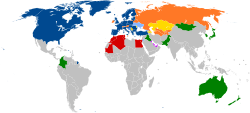History
The ATA was created on 18 June 1954. [2] Since the end of the Cold War and the dissolution of the Warsaw Pact, the role of the Atlantic Treaty Association has changed considerably. In 1992, the ATA Constitution was amended to accommodate associate members and observers from non-NATO countries. In 1992, the Atlantic Club of Bulgaria joined the ATA as its first associated member from a non-NATO country. [4] Given NATO's shifting nature, the ATA now works beyond the borders of the Euro-Atlantic area, operating in Central and Eastern Europe, the Mediterranean, and the South Caucasus. Following the accession of new NATO countries in 1999 and 2004, ATA membership expanded considerably, and its security focus has shifted south and eastward. [5] [6] [2]
The ATA is active in NATO's Partnership for Peace (PfP) and Mediterranean Dialogue programs and is increasingly engaged with officials and institutions based in members of the Istanbul Cooperation Initiative (ICI) and Partners Across the Globe.
Mission
The Atlantic Treaty Association's stated mission is to support the values set forth in the North Atlantic Treaty: freedom, liberty, peace, security, and the rule of law. As such, the ATA aims to serve as a forum for debate in which member associations can realize common interests and democratic goals. [2] [1] The youth branch of the ATA, the Youth Atlantic Treaty Association (YATA) was created in 1996. [2] YATA seeks to educate and promote debate among youth in order to create responsible future political leaders who have an understanding of the values set forth in the North Atlantic Treaty. [5]
Structure
The statutory bodies governing the ATA are the Assembly and the Board. [1] [6]
The Assembly
The Assembly stands as the paramount decision-making body within the ATA. It comprises delegates from Member, Associate Member, and Observer Member associations. Each Member and Associate Member, except Observer Members, holds one voting right. [6] [1] [7]
The Board
The Board, consisting of the President, ten elected Directors, and the ex officio ATA President, plays a crucial role in ATA governance. The ATA President participates specifically in matters concerning youth activities during Board meetings. The ATA President may also extend invitations to individuals to assist in the Board's work. [6]
This page is based on this
Wikipedia article Text is available under the
CC BY-SA 4.0 license; additional terms may apply.
Images, videos and audio are available under their respective licenses.

